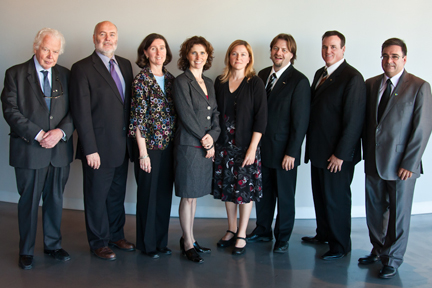Nouvelles
Ville de Montréal, AMT, MTQ and STM join forces with Polytechnique to assess and implement transportation sustainability - Launch of the MOBILITÉ Research Chair
Extending métro lines, introducing carsharing and bikesharing systems, building bridges and roads with dedicated bus lanes, re-engineering and improving the safety of intersections and arteries ... How do you anticipate and assess the impacts of such initiatives, taking into account both individual needs and community sustainable development issues?
To answer this complex question, the Ville de Montréal, Agence métropolitaine de transport (AMT), Ministère des Transports du Québec (MTQ) and Société de transport de Montréal (STM) have joined forces with École Polytechnique to launch the MOBILITÉ Research Chair. Held by Dr. Catherine Morency, a professor in the school's Department of Civil, Geological and Mining Engineering, the Chair will help assess the impact of transportation projects, policies and plans on sustainable development through targeted research, experimentation and methodological development.
To attain its objectives, the MOBILITÉ Chair will receive subsidies totalling $875,000, distributed over five years. The Ville de Montréal, AMT and MTQ will each invest $250,000, to which the STM will add $125,000.
 Dr. Morency's work will focus on extrapolating the data derived from new technologies. For
example, data from the OPUS fare cards used in Montréal's bus and subway systems will allow passenger-boarding points to be
determined and various performance indicators to be deduced. The Chair and its partners will also experiment with ways of
assessing traffic conditions -- for example, through Bluetooth sensors or data obtained from the GPS devices in Communauto
(local carsharing) vehicles. Dr. Morency emphasizes that the Chair's work will be carried out in strict observance of privacy
and data-protection rules.
Dr. Morency's work will focus on extrapolating the data derived from new technologies. For
example, data from the OPUS fare cards used in Montréal's bus and subway systems will allow passenger-boarding points to be
determined and various performance indicators to be deduced. The Chair and its partners will also experiment with ways of
assessing traffic conditions -- for example, through Bluetooth sensors or data obtained from the GPS devices in Communauto
(local carsharing) vehicles. Dr. Morency emphasizes that the Chair's work will be carried out in strict observance of privacy
and data-protection rules.
"The introduction of the Sustainable Development Act, along with general concerns about this topic, are leading decision-makers to draw up a number of criteria for assessing transportation options: the environment and land-use planning, obviously, but also social equity, accessibility, user safety, public health and the economy," Dr. Morency explained. "Our goal is therefore to develop rigorous, objective and transparent mobility indicators with which stakeholders can quantitatively assess the impact of different transportation options and align their actions with current visions of sustainable development."
The need to effectively measure the contributions and impacts of various transportation alternatives and strategies is in fact a major concern in the current context of the implementation of the Ville de Montréal's Transportation Plan, the AMT's Strategic Plan for the Development of Metropolitan Transportation, the STM's Action Plan for Sustainable Development, and similar initiatives from other Greater Montréal transportation companies. Moreover, the Québec government's adoption of the Sustainable Development Strategy 2008-2013, which directly affects the MTQ, entails regular progress reports based on relevant indicators. Since all of these plans and strategies emphasize the importance of aligning transportation choices with sustainable development principles, creating a research chair that focuses specifically on developing sustainable mobility indicators is a logical step.
"The Ville de Montréal adopted its first Transportation Plan following extensive public consultations in 2008," said Claude Carette, Interim Director of the Ville de Montréal's Transportation Division. "Our focus is sustainable mobility, respect for the environment, safety, efficient buses and the promotion of active modes of transportation like walking, rollerblading and biking. The introduction of the BIXI (self-serve bicycle) system and 50 additional kilometres of bike lanes are positive initiatives, but we need to study the issue in greater depth. For this reason, we decided to collaborate with a university and researchers who will develop performance indicators, establish public transportation models and propose investigative methodologies regarding how goods are transported through urban spaces." Mr. Carette began suggesting creation of the MOBILITÉ Chair to Dr. Morency in 2009.
For his part, Pierre-Luc Paquette, the AMT's Vice-President of Communications and Marketing, said: "As part of its mission of improving regional mobility through the promotion of public transportation in the metropolitan Montréal region, the AMT is proud to partner with the MOBILITÉ Chair. Through this partnership, we can pool our expertise and tools, the better to manage transportation and monitor emerging public transit needs. The Chair's findings will greatly help the AMT with its long-term transportation planning."
Added Pierre Fernandez Galvan, the MTQ's Director of Planning and Resource Co-ordination: "Beyond the ministry's particular interest in transferring methodological developments to other metropolitan regions of Québec, we hope that working with the Chair will make our various modelling tools more effective. Being able to better map how people and goods move through the transportation networks will help us to better assess roadway and mass transit projects, particularly in terms of their environmental impacts and greenhouse gas emissions."
And Jocelyn Grondines, Director of Studies with the STM's Network Planning and Development Department, said: "As a leader in the field of sustainable mobility, the STM has sustainable development at the heart of its mission and strategic planning. Indeed, sustainable mobility is a key priority in the organization's sustainable development action plan. Work carried out by the MOBILITÉ Chair will support our actions in this regard and help us tailor our modelling tools to better assess how we can improve our transit service."
Training tomorrow's sustainable mobility specialists
Another important aspect of the MOBILITÉ Chair is
the training it will provide to many sustainable mobility evaluation specialists. Master's and PhD students who undergo
internships with the four partner institutions will gain knowledge of the day-to-day challenges and issues faced by
transportation organizations. In return, the internships will benefit professional development within the organizations.
Research associates from Québec, Canada and abroad
The MOBILITÉ Chair will receive ongoing input from Polytechnique researchers interested in transportation, including Martin
Trépanier (information systems and freight transportation), Nicolas Saunier (road safety) and Bruno Agard (data mining).
Researchers at other national and international institutions, including Paul Lewis (Université de Montréal), Antonio Paez
(McMaster University), Matthew Roorda (University of Toronto), Patrick Bonnel (Ecole nationale des travaux publics d'Etat
[ENTPE], Lyon) and Kostas Goulias (University of California, Santa Barbara), will also participate. Lastly, two research
associates -- Hubert Verreault, a Polytechnique graduate, and Marie Demers, author of the book Pour une ville qui marche / Walk
for Your Life -- will contribute to the Chair on a continuous basis.

MOBILITÉ Research Chair on assessing and
implementing sustainable transportation



